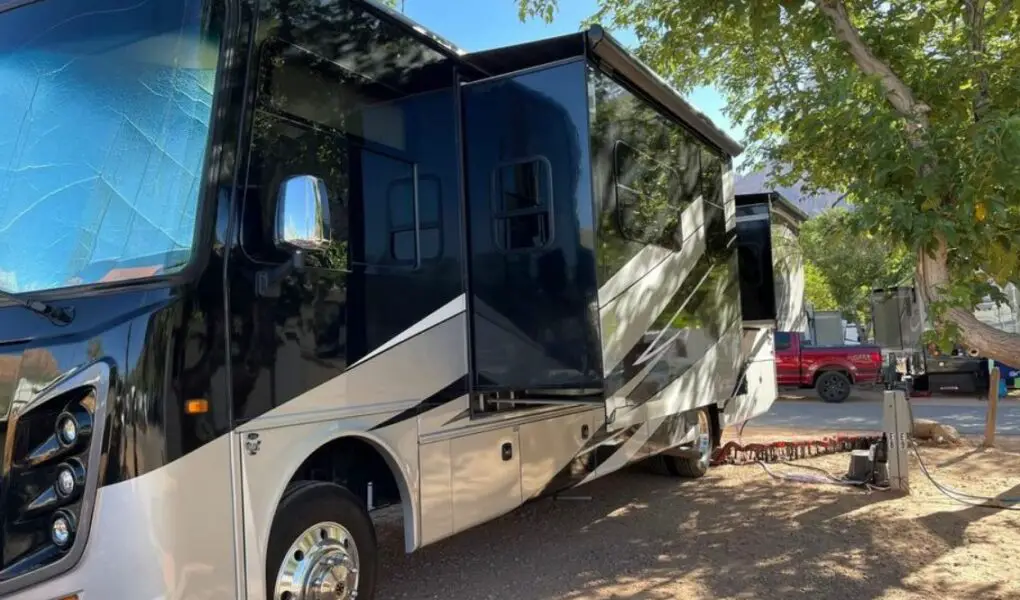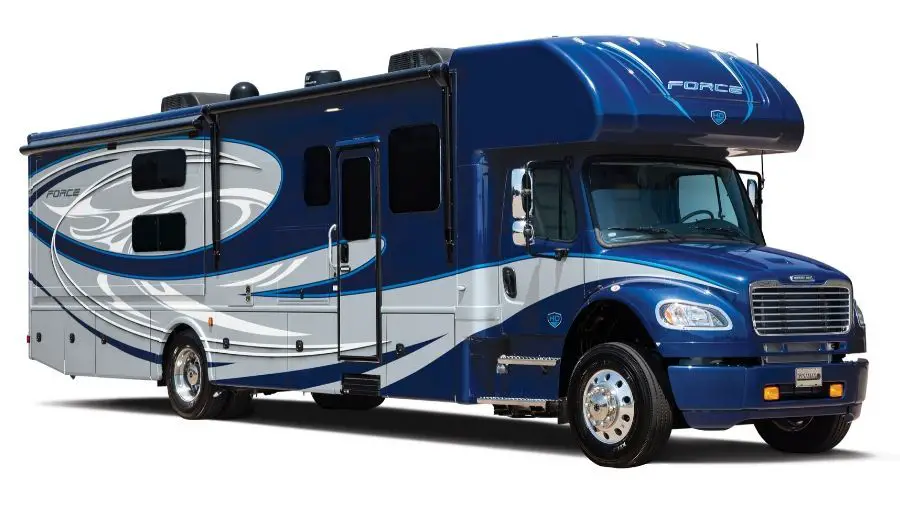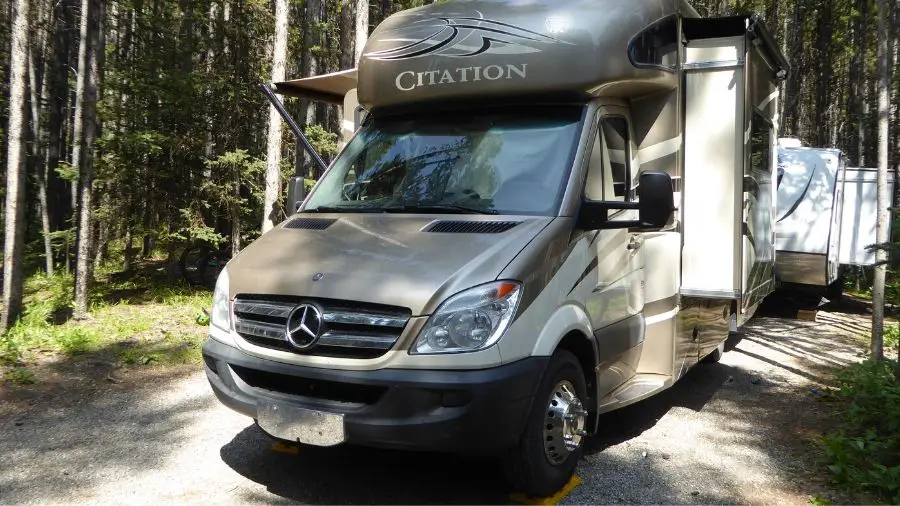Class A motorhomes are one of the most popular RV styles on the market today. These units combine style, size, and comfort into a single motorized package that can be powered by either a diesel or gas drivetrain. They are also available in a range of sizes and their designs have been time-tested to be reliable for extended long-distance travel.
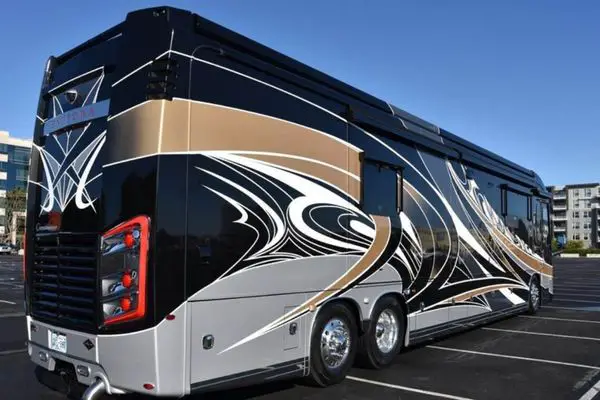
They do have one major drawback and that is that they are not the most convenient RVs for running day-to-day chores. This is why many Class A owners also use their motorhomes to tow. That towing is usually limited to a second vehicle or a trailer with a second vehicle. However, there are some owners who need to tow larger trailers for a traveling business or to carry gear they don’t want to store inside the RV.
This makes the two ratings of Class A RV an important part of the purchasing decision. It’s important to know what the limits are of the RV you are considering purchasing and what may affect those limits down the road. Here we will look at some of those topics.
10 Class A Motorhome towing weights (chart of 10 class A motorhomes)
| RV | Length | Fuel Type | Engine Size | Towing Capacity |
|---|---|---|---|---|
Entegra Coach Cornerstone | 45 ft | Diesel | 15 Liter | 20,000 lbs |
Entegra Emblem | 36 ft | Gas | 7.3 Liter | 6,000 lbs |
Tiffen Zephyr | 45 ft | Diesel | 15 Liter | 20,000 lbs |
Tiffen Allegro Breeze | 31 ft | Diesel | 6.7 Liter | 5,000 lbs |
Jayco Alante | 30 ft | Gas | 7.3 Liter | 5,000 lbs |
Winnebago Journey 34N | 34 ft | Diesel | 8.9 Liter | 10,000 lbs |
Winnebago Vista | 30 ft | Gas | 7.3 Liter | 5,000 lbs |
Newmar King Aire | 45 ft | Diesel | 15 Liter | 20,000 lbs |
Thor Axis 24.4 | 26 ft | Gas | 7.3 Liter | 7,500 lbs |
Coachman Mirada 315KS | 33 ft | Gas | 7.3 Liter | 4,000 lbs |
What Affects The Towing Capacity?
There are several factors that can affect the towing capacity of an RV. The main factors are component strength, power, and braking ability. In a nutshell, the towing capacity will be limited by the strength of the weakest component in the system. If everything is rated at 20,000 lbs, but you use a 5,000 lb ball on your hitch then your tow capacity is limited to 5,000 lbs.
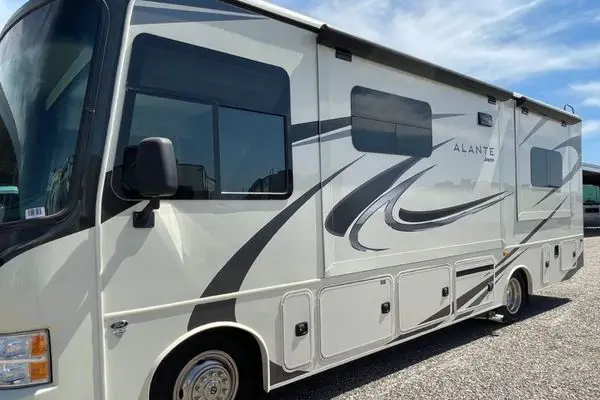
This applies to everything from the ball to the frame, suspension, and drivetrain of the RV. Remember that the frame and structural components of the RV have to support the RV itself before you can add something to the back to be towed. If the RV itself is very heavy relative to the capacity of the RV structure, then that will limit how much you can tow with it.
The engine and drivetrain can be limiting factors if they are not designed to handle the weight of the RV and the additional weight of a trailer. And, the braking and suspension systems can be limiting factors as well. The additional weight of a trailer can put significant extra stress on the suspension and braking systems. If they can’t handle it then you are likely to lose control of the RV to disastrous results.
How Do Fuel Type And Engine Size Affect Towing Weight?
When looking at engine specifications you’ll see ratings for horsepower and torque. While most of us get all giddy at high horsepower numbers, the torque number is the one you should really focus on when it comes to towing. Torque is the strength at which the motor can twist the crankshaft, which the drivetrain turns into the ability to pull in a linear direction.
Diesel engines are known for generating more torque than identically sized gas engines. There are a number of reasons for this, but suffice it to say that a 6 L diesel engine will almost always make more torque than a 6 L gas engine. That means liter for liter diesel engines is better towers. Also, diesel engines generate more torque at much lower RPMs and they have lower maximum rpm ratings.
Engines that work hard at lower RPMs tend to last longer than engines that need to spin fast to do the same amount of work. This is a key reason commercial trucks use diesel engines. They work hard and last longer than gas engines.
How Does Weight Affect Towing?
When it comes to towing and weight you have to view the RV and trailer as a single vehicle. In your RV specs, you’ll see a couple of numbers that are important. Empty weight is the weight of the RV as it rolled off the factory floor with nothing in it. The Gross Vehicle Weight Rating (GVWR) is the most the RV can weigh with all your stuff in it.
To figure out how much stuff you can put in it you subtract the empty weight from the GVWR. That stuff can include all your gear, but it also includes batteries, water in your tanks, waste in your tanks, propane, fuel, you and your passengers, food, and even the bobblehead on the dashboard. The Gross Combined Vehicle Weight Rating (GCVWR) is the total of the RV and everything (including trailers) attached to it.
You cannot legally drive the RV on the road if you are exceeding either (or both) the GVWR or the GCVWR. You also cannot exceed the towing capacity. A trip to the CAT scales will tell you the weights you need to know. If you add weight to the trailer and you exceed the GCVWR then you’ll need to lighten the load in the RV by leaving some stuff behind. If you add stuff to the RV and exceed the GCVWR then you’ll need to lighten the load in the trailer.
How Does The Hitch Size Affect Towing?
All the components in your hitching system will have specific weight ratings. Your towing capacity cannot exceed the capacity of the lowest rated component in your hitching system. If your receiver can handle 5,000 lbs. but you put a 10,000 lb. bar and ball on it then you are still limited to 5,000 lbs. total capacity. Never exceed the limits of the weakest link.
Putting All The Factors That Affect Towing Together?
When you sit down and look at it, everything about the RV affects its towing capacity. The engine, transmission, brakes, frame, suspension, tires, wheels, number of axles, how it’s built, and how it’s loaded will all have a bearing when it comes to towing. Once you attach a trailer you have essentially turned the RV into a new, larger, heavier vehicle in which all the original equipment must still be able to move, stop and turn in a controllable fashion.
Which Class A Can Tow The Most Weight?
The Entegra Coach Cornerstone is the towing leader of Class A motor homes. It’s powered by a Cummins® 15 liter X15 turbocharged 605 HP engine with 1,950 lb. ft. torque at 1,150 RPM. With that power pushing through an Allison 4000 MH 6-speed transmission, the Cornerstone has a very respectable 20,000 lb maximum towing capacity.
The key here is the 15-liter diesel drivetrain. This drivetrain is commonly used by RV manufacturers in their top-of-the-line diesel pusher class A units. As noted in the chart above, there are other manufacturers who meet the same 20,000 lb towing capacity which will give you several other options if you are looking for a class A with that kind of towing power.

